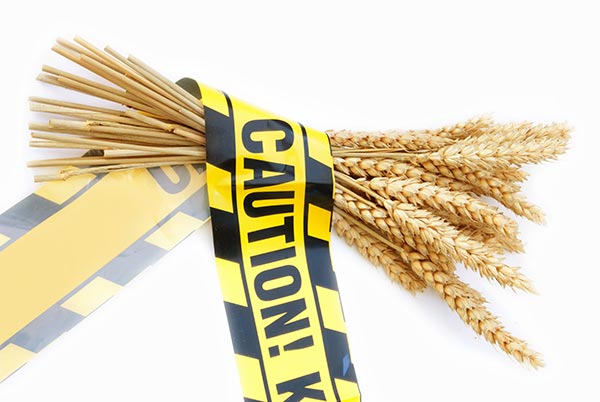
Suspect Gluten? Get the Right Tests
There is a lot of talk about gluten these days. You’ll hear many terms bandied about such as celiac disease, gluten sensitivity, non-celiac gluten sensitivity, gluten intolerance, and wheat (gluten) allergy.
What do they mean? What should you do if you suspect gluten may be a problem contributing to your health issues? Read on.
Celiac disease is the best known condition associated with an intolerance to gluten. It is an autoimmune disease where gluten causes a destruction of the lining of the small intestine.
This is serious for two reasons:
• The small intestine is the part of the body that turns food into fuel and delivers that fuel to all the cells of the body. With no fuel, the cells don’t “eat” and therefore cannot perform their job. The result is malfunction and disease.
• The small intestine houses 70-80% of the human immune system. The presence of gluten in the diet for those with celiac disease acts to weaken the immune system, which causes malfunction (potentially leading to other autoimmune diseases), a tendency towards cancer, and a host of other conditions.
The history of celiac disease is not new. It was discussed initially in the second century, but Dr. Samuel Gee, a pediatrician, is considered to have offered the first present-day description of the disease in 1887. It’s been more than 125 years and sadly, 85 – 97% of celiac sufferers remain undiagnosed.
Many people notice that they feel poorly after a heavy meal containing gluten (which typically means wheat in this country, since rye and barley are not as abundant in our diet). Thirty percent of the population carries the genes for celiac disease, despite the 1-2% incidence of the disease.
Many believe that our poor diets and increasing exposure to drugs, genetically modified foods, and toxins all play a role in creating poor gut health and the increasing incidence of the disease.
But even at 1-2%, celiac is considered the most common
lifelong disorder in the US and Europe.
If you suspect you may have celiac disease, here are the steps you should take:
• See your doctor and explain what you’ve noticed symptom-wise.
• Ask for a blood test that includes the following (these are classic tests used by most medical doctors as part of a celiac panel):
a. tTG, IgA
b. EMA, IgA
c. Deamidated gliadin peptides, IgG
d. AGA both IgA and IgG
e. Total IgA – this is done to validate the results of a, b, and d
Note: Tests a-c are exclusively tests for celiac disease.
• Get a copy of the results and ensure they are interpreted by someone who is an expert in the field. I cannot tell you how many positive results were glossed over by non-experts just because they didn’t have adequate knowledge of interpretation. (If you need help with this, let me know.)
• If you have a strong positive, especially in categories a, b, or c, your doctor may say that you need to get a biopsy to determine if you indeed have celiac disease. This is adequate advice, but not necessarily a mandatory procedure. I’ll explain in a moment.
• Lastly, if only d is positive, this doesn’t mean that you’re okay. That is why it’s important to get a copy of your results and have an expert look them over. Test d is used to evaluate the condition of gluten sensitivity, not celiac disease. It is used in celiacs to see if they are sticking to their diet but it is not a test to diagnose celiac disease.
Interpreting Test Results
A paper published in BMC Medicine 2012 (BioMed Central) stated that there were five criteria that should be used to diagnose celiac disease. Only four of these five criteria need to be positive in order to make a diagnosis. They are as follows:
![]() Has symptoms consistent with the disease
Has symptoms consistent with the disease
![]() Feels better on a gluten-free diet
Feels better on a gluten-free diet
![]() Has the genes for the disease
Has the genes for the disease
![]() Has a positive blood test for the disease (tests mentioned previously)
Has a positive blood test for the disease (tests mentioned previously)
![]() Has a positive biopsy
Has a positive biopsy
Notice that the intestinal biopsy is only one of the criteria. Historically, it was the “gold standard” for celiac diagnosis. That is no longer the case and therefore it is important that your practitioner is up to date on current research regarding evaluation of test results.
We began this article with a list of terms and thus far have only reviewed celiac disease. Let’s continue down the list.
Gluten sensitivity and non-celiac gluten sensitivity are the same thing. The important thing is to understand what gluten sensitivity is. When I wrote the book The Gluten Effect five years ago, it was specifically about gluten sensitivity. At the time there was no official agreement that the condition even existed. I am happy to say that the information in the book is even more current today than the day I wrote it because certain studies have since been published that validate the data within the book.
Gluten sensitivity does not involve the same genes as celiac disease and its frequency is estimated to be much greater – about 30% of the population. With both gluten sensitivity and celiac disease, gluten is wreaking havoc on the health of the body. The treatment is exactly the same: zero gluten in the diet.
Gluten sensitivity is also interesting in that it doesn’t necessarily present itself with digestive symptoms. In fact, neurological symptoms are often more present and typically precede digestive complaints by as much as several years.
There is no limit to the systems and organs gluten can affect. All are potentially affected by gluten in various individuals. This means that liver, skin, hormonal, thyroid, joint, brain, and heart symptoms can be a direct result of gluten sensitivity or celiac disease.
For this reason, I applaud you for reading this article and for having the good sense to discover if you have a problem. It’s important for your longevity, let alone your day-to-day health. And, since both conditions run in families, if you find that you’re affected, look around your family and suggest to others who are having health issues that they too delve into this subject.
As a proponent of root cause medicine, where the true underlying root cause of a condition is sought out in order to completely eradicate it, the importance of diagnosing a gluten problem is vital. Imagine the number of people with such conditions as obesity, fatigue, migraine headaches, depression, thyroid disease, autoimmune disease, skin conditions, and so much more, who suffer simply because they consume gluten. Also understand that if you react to gluten and you don’t know it, continuing to eat it will shorten your life. This too is proven in research.
Gluten intolerance and wheat allergy
“Gluten intolerance” was a term used to embrace both celiac disease and gluten sensitivity, but according to Dr. Alessio Fasano, it is no longer in use. “Allergy” is never used in conjunction with gluten. A true wheat allergy is uncommon – about 0.1 to 0.2% of the population. The reaction to gluten is a sensitivity, different from an allergy in many ways. Too often the word “allergy” is used in connection with gluten. It is incorrect. (One can have a wheat allergy and that is simple to diagnose. Ask your doctor for an IgE blood test for wheat.)
What if your test is negative?
Unfortunately, there is no perfect test. Earlier, I mentioned the classic blood tests. My favorite test is done by a specialty lab. I bring it up because of three things:
• I don’t want anyone who truly has celiac disease or gluten sensitivity to continue eating gluten due to a faulty test.
• The standard tests look predominantly for celiac disease. Only the AGA test is likely to find gluten sensitivity, but it looks for only a single immune response and is therefore restricted. This opens the door to a false negative test.
• Having a piece of paper from a lab that says you are gluten sensitive is sometimes just the push you need to comply with a gluten-free diet.
I have no personal affiliation with this lab – I simply recommend it because it offers the most comprehensive test available to date on the market. Its name is Cyrex Labs and its gluten test measures 10 or more possible reactions that the immune system can mount against gluten.
Cyrex Labs is a private lab. Your doctor will have to contact it, order a test kit, and then be willing to “get up to speed” on how to interpret the test.
Recall that we miss diagnosing about 95% of our celiacs and 98-99% of those suffering with gluten sensitivity. I believe this test dramatically lessens false negatives, a good thing for sure.
What should you do if you can’t get tested?
Not everyone is able to get tested. What should you do if a formal lab test just isn’t possible? Eliminate gluten completely (absolutely no cheating) for 30 days and see how you feel. If you notice an improvement, that is a legitimate test. While I would never encourage you to reintroduce gluten into your diet if you are convinced that it’s bothering you, gluten typically sneaks in either purposefully or accidentally. When it does, what do you notice?
I’d love to say that is a fool-proof test. Cheat, feel bad, positive test! Unfortunately, gluten has a more covert nature, meaning that not everyone “feels” it when they cheat. Gluten may be affecting you on such a deep level that you cannot feel its destruction. Or, since a reaction may occur three to eight days after ingestion, you’re not convinced that gluten could be the cause of your symptoms after so many days. I can assure you that eight days is the window for reactions.
It’s not a perfect system. If you have a negative test but still feel better off gluten, trust yourself and trust your body. The good news is that from my experience I have observed that nothing bad should ever occur to your health from eliminating gluten. In fact, there’s a substance called wheat germ agglutinin that is thought to cause negative health effects in everyone who eats wheat, whether they have celiac disease, gluten sensitivity, or not. Much evidence is growing to support that wheat is just not our friend and shouldn’t be a part of our diet.
Making the Change
The first thing you need to do when going gluten-free is to get educated.
Next, clean out the pantry. You don’t want any temptations. There is no point in just “cutting down” on gluten – it’s an all or nothing proposition. Just go for it!
Don’t make the mistake of buying a bunch of gluten-free junk foods. It’s fine to have a treat now and again, but just because something is labeled gluten-free doesn’t make it good for you.
Focus instead on an abundance of fruits and vegetables, beans, legumes, coconut and olive oil, fresh nuts and seeds, organic eggs, and a small amount of animal protein. Drink eight glasses of water daily and exercise three hours weekly.
Rice is a safe grain for most, but watch out for oats. About 15% of those sensitive to gluten also react to oats.
Finally, don’t be hard on yourself. If you are eating a salad and accidentally bite into a crouton, don’t eat the rest of the salad. Realize your mistake and if you’re at a restaurant, return it and ask them to remake it. One little mistake does not condone a full “off the wagon” experience. Just get right back onto zero gluten and carry on.
As always, consult a health professional before beginning any new protocol.
To your good health,
Dr Vikki Petersen, DC, CCN
References:
National Foundation for Celiac Awareness
The University of Chicago Celiac Disease Center, August, 2005
Mayo Clinic “Discovery’s Edge:, July, 2010, :Celiac Disease: On The Rise”
“Spectrum of gluten-related disorders: consensus on new nomenclature and classification” published in BMC Medicine 2012, 10:13 doi:10.1186/1741-7015-10-13
“The Lancet”, Vol. 358, August 4, 2001 358(9279):356-61 “Mortality in patients with coeliac disease and their relatives: a cohort study
“Archives of Internal Medicine”, Vol. 163, No. 13 July 14, 2003
“Causes of Death in Patients with Celiac Disease in a Population-Based Swedish Cohort.
Always seek the advice of a medical professional before starting any new protocol. Gluten Free & More magazine, published by Edgewater Park Media Inc. (EPM) is publishing this article for purposes of medical topic, however no warranty whatsoever is made that the article is accurate and there is absolutely no assurance that any statement contained or cited in the article touching on medical matters is true, correct, precise or up to date. EPM further emphasizes that nobody in the company takes responsibility for the results or consequences of any attempt to use or adopt any information presented in the article.
Written by Dr. Vikki Petersen




Pingback: Celiac Awareness – Gluten testing? | Gluten Free. Lekker food! Lekker life!
Pingback: Gluten Free Vegan Stroganoff | Gluten Free Recipes | Blog | Vegan